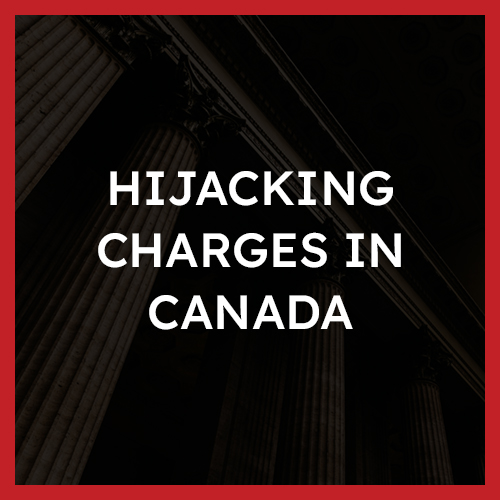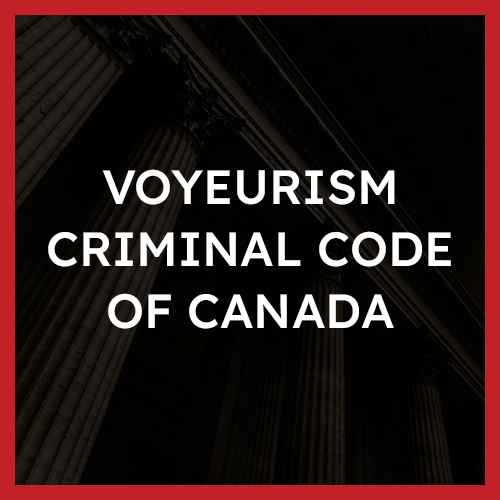Hijacking Laws in Canada
What is a hijacking charge?

A hijacking charge is a serious criminal that transpires when an individual, through the use of force, threat of force, or any other form of intimidation, seizes or takes control of an aircraft with the intention of confining or imprisoning anyone on board against their will. This offence also encompasses the act of transporting individuals against their will to a location other than the aircraft’s scheduled place of landing, holding any person on board for ransom or involuntary service, or causing the aircraft to deviate from its designated flight plan.
Hijacking is an indictable offence, which means it is a more serious type of criminal charge in Canada, and upon conviction, the perpetrator may face severe consequences, including imprisonment for life.
Examples
Some examples of a hijacking charge may include the following:
- Tying up a pilot of an aircraft to take control;
- Breaking into the cockpit of an aircraft to take it to a place other than it was scheduled to arrive;
- Holding passengers of a grounded plane hostage; and
- Threatening violence to have an aircraft deviate from its flight plan.
Defences
The defences available to a hijacking charge are entirely dependent on the facts of your case.
However, some defences to an escape from lawful custody charge may include:
- The accused was wrongly identified as the person who hijacked an aircraft;
- The accused was forced or threatened into committing the hijacking against their will, and they reasonably believed that their life or the lives of others were in imminent danger; and
- The accused took action to control an aircraft due to an emergency situation to prevent greater harm.
Punishment
A hijacking charge is an indictable offence, which entails a maximum punishment as follows:
- Imprisonment for life.
In cases of a hijacking charge, it’s important to understand the potential consequences. The maximum punishment for this offence is a substantial term of imprisonment for life, which underscores the seriousness with which the legal system views any attempt to hijack an aircraft. However, there are no mandatory minimum penalties for this offence which allows the courts some flexibility to consider the unique circumstances of each case. It is important to note that if convicted of a hijacking charge, the conviction can entail severe consequences for current and future employment opportunities and immigration status.
Overview of the Offence
According to s. 76 of the Criminal Code:
Intimidating Parliament or legislature
76 Every one who, unlawfully, by force or threat thereof, or by any other form of intimidation, seizes or exercises control of an aircraft with intent
(a) to cause any person on board the aircraft to be confined or imprisoned against his will,
(b) to cause any person on board the aircraft to be transported against his will to any place other than the next scheduled place of landing of the aircraft,
(c) to hold any person on board the aircraft for ransom or to service against his will, or
(d) to cause the aircraft to deviate in a material respect from its flight plan,
is guilty of an indictable offence and liable to imprisonment for life.
The Guilty Act (Actus Reus)
The actus reus for a hijacking charge under s. 76 is established by proof, beyond a reasonable doubt, of the following:
In cases of a hijacking charge, the Crown must establish beyond a reasonable doubt that the accused engaged in the physical acts or conduct that constitute the offence. These acts include seizing or exercising control of an aircraft, using force, or the threat or force, or some form of intimidation to gain control of the aircraft, confining or imprisoning anyone on the aircraft against their will, transporting anyone against their will to a destination other than the scheduled destination of the aircraft, deviating from the flight plan, or hold anyone on board for ransom.
The Guilty Mind (Mens Rea)
The mens rea for a hijacking charge under s. 76 include proving, beyond a reasonable doubt, that:
To secure a conviction for hijacking, the Crown must establish beyond a reasonable doubt that the accused possessed the requisite mental element to commit the offence. In this case, the mens rea involves proving that the accused had a specific intent to confine or imprison anyone on the aircraft against their will, the intent to transport anyone against their will to any place other than the scheduled destination of the aircraft, to hold any person on board for ransom or to force them into service against their will, or the intent to cause the aircraft to deviate from its scheduled flight plan.
Defences
How to Beat a Hijacking Charge
Every case is different. The availability and strength of any defence depend entirely on the specific facts of your case. The strength of any available defence rests on the evidence against you and the precise details of the allegations. However, the following are some common defences that may be used when fighting a hijacking charge:
Factual innocence
A strong defence against a hijacking charge is to maintain that you are factually innocent. If you can show that the facts and the evidence do not support that you committed any of the acts associated with hijacking, then you may have a defence that you were factually innocent.
Lack of Intent
Lacking the intent to commit acts associated with hijacking can be a significant defence in cases involving a hijacking charge. To secure a conviction, the Crown must demonstrate beyond a reasonable doubt that the accused had a specific intent to take unlawful control of an aircraft. If the accused can provide evidence or arguments showing that their actions were not intended to hijack and control an aircraft but rather were part of an emergency situation or they were forced to commit the actions under duress, it can serve as a strong defence.
Identity
Depending on the circumstances of your case, a possible defence to a hijacking charge may be to raise an identity defence. In this case, for this defence to be raised successfully, you will have to prove that you were not the person hijacked an aircraft.
Any applicable Charter defences
The Charter sets out your rights and freedoms before and after your arrest. If the police fail to abide by these rights deliberately or inadvertently, it could aid in your defence. If any of your Charter rights have been violated before or after your arrest, you may be able to have some or all of the evidence that the Crown is relying on to secure a conviction excluded under s. 24(2) of the Charter.
Punishments
The Criminal Code provides for a possible maximum term of imprisonment for life for those convicted of a hijacking charge.
Upon conviction of the charge of hijacking, the sentencing provisions in Canada can vary depending on several factors, including the specific circumstances of the case. The maximum punishment for this offence is imprisonment for life. However, the actual sentence imposed can be influenced by various factors, such as the severity of the act, the accused’s prior criminal history, any aggravating or mitigating factors, and the judge’s discretion. It is crucial to consult with legal counsel to understand the potential sentencing options and their specific application to your case, as they can significantly impact the outcome following a conviction.
Frequently Asked Questions
What kind of offence is hijacking?
Hijacking is a grave criminal offence classified as an indictable offence, underscoring its serious nature in the eyes of the law. An indictable offence generally carries no minimum penalty, and in the case of hijacking, it can result in life imprisonment with no chance of parole for 25 years. This underscores the severe legal consequences attached to hijacking convictions, reflecting the potential threats to lives, air travel disruption, and security concerns associated with such acts. Individuals charged with an indictable offence, including hijacking, retain the right to choose how they will be tried. They can opt for a trial with a judge alone in Provincial Court, with or without a preliminary hearing, or choose a judge-alone trial in Superior Court, again with or without a preliminary hearing. Alternatively, the accused may elect a jury trial, again with the flexibility of including or excluding a preliminary hearing. This legal framework ensures that those charged with hijacking have the opportunity to determine the trial format that aligns with their defence strategy and ensures a fair and just legal process.
Is hijacking a crime?
Yes, hijacking is unequivocally a serious criminal offence. This criminal act involves the unlawful seizure or control of an aircraft through the use of force, threat of force, or intimidation. The gravity of hijacking lies in its potential to endanger lives, disrupt air travel, and pose significant security threats. This crime is typically classified as an indictable offence, highlighting its severity within the legal system. Individuals charged with hijacking can face severe penalties, including the possibility of life imprisonment with no chance of parole for 25 years. The legal framework surrounding hijacking underscores the importance of maintaining the safety and security of air travel and ensuring that those who engage in such criminal conduct are held accountable for their actions.
What is the minimum sentence for kidnapping in Canada?
If convicted of kidnapping in Canada, the potential sentences are stern, with the possibility of life imprisonment. The Criminal Code mandates minimum sentences for kidnapping, which vary based on the circumstances of the offence. When a restricted or prohibited firearm is employed during the commission of the crime, or if any firearm is used for the benefit of, at the direction of, or in association with a criminal organization, the minimum sentences escalate. A first offence carries a minimum sentence of five years, while a second or subsequent offence raises the minimum to seven years. Additionally, if a firearm is used in the commission of the offence, the minimum sentence is set at four years. These mandatory minimums underscore the severity with which Canadian law addresses the crime of kidnapping, particularly when firearms are involved or when the offence is linked to criminal organizations.
Published Decisions
Saini v Canada (Minister of Citizenship and Immigration), 2003 FTC 154 (CanLII)
This was an application for judicial review of a decision of the Citizenship and Immigration Officer where the Immigration Officer determined that the Applicant had insufficient humanitarian and compassionate grounds for processing their application for permanent residence from within Canada. The Applicant, a citizen of India, was convicted in Pakistan of hijacking a passenger airliner and served 10 years in jail. In this case, the court discussed the gravity of hijacking and how it is a crime that is universally condemned and punished severely. The court also proclaimed that hijacking is considered to be among the most serious of criminal offences.
As a result of the previous charge, the application for judicial review was dismissed.
You can read the full decision here.
Singh v Canada (Minister of Citizenship and Immigration), 1997 CanLII 5893 (FC)
In this case, the Applicant was found to have previously committed a terrorist act by hijacking an Indian airplane and diverted it from its scheduled course and into Pakistan. Although convicted out of the country, the court held that the Applicant was convicted of the Canadian equivalent of section 76 of the Criminal Code. The Court held that the Applicant was a terrorist and subject to deportation because of their hijacking conviction.
You can read the full decision here.
Charkaoui (Re) (F.C.), (2008) FC 61 (CanLII), [2009] 1 FCR 507
In this case, the accused had allegedly discussed hijacking a commercial aircraft with someone to crash it into a foreign target. The court was also investigating if the accused travelled to Afghanistan to receive military and theological training. Due to the confidential information collected by the Crown affecting national security, only summary information was disclosed to the accused. The Court held that more information needed to be given to the accused so they could answer the allegations made against them.
You can read the full decision here.
Contact Us
If you have been charged with a criminal offence, visit our location pages to contact our team.
About The Author
Ask A Question
We endeavor to respond to questions within 24 hours. If your matter is urgent, please call our office or submit a request for a free consultation.







